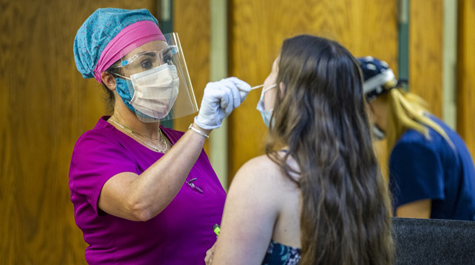W&M provides guidance on vaccines and public health protocols as semester begins
The spring semester at William & Mary will be different, but in ways that have become familiar to the campus community, as the nation marks a year of grappling with COVID-19.
In a recent message to the university, William & Mary’s Chief Operating Officer and COVID-19 Director Amy Sebring outlined the steps W&M is taking to support vaccination and the critical public health protocols that will continue throughout the semester.
“One of the lessons we learned from the fall was that our shared commitment to protecting our community’s health allowed us keep positivity rates below that of other communities,” she said. “Each student, faculty and staff member plays an important role in this effort. I’m confident we will build on the lessons we’ve learned and double-down on our health practices.”
Vaccinations
William & Mary is working closely with the City of Williamsburg on a coordinated vaccination plan to ensure the university is prepared to vaccinate at scale, once supply becomes available, Sebring explained. The Virginia Department of Health’s local Peninsula Health District is ultimately responsible for the distribution plans in Williamsburg, with Three Rivers Health District overseeing distribution plans in the Gloucester region.
The university is currently coordinating with local Virginia Department of Health districts to identify W&M and VIMS employees who have job responsibilities that qualify them for vaccination in Phase 1A or Phase 1B.
Employees with direct patient-care responsibilities – such as those working in the Student Health Center or in dedicated quarantine and isolation housing – qualify for Phase 1A distribution and have already received their first vaccination. Police and other essential workers eligible for Phase 1B distribution will be contacted directly with instructions on when to schedule a vaccination, Sebring said in the message.
While there are members of the university community who do not qualify for early vaccinations based solely on their job responsibilities, they may have additional medical or age-related circumstances that qualify them for an earlier phase of distribution. Those community members should follow up with VDH through the VDH COVID-19 Vaccination Response portal and contact their physician or healthcare provider, Sebring said.
Healthy Together Community Commitment
The majority of faculty and staff members, because they work in Virginia higher education, qualify for the 1C distribution schedule. Sebring said the university’s Public Health Advisory Team anticipates most students will be vaccinated with the general population following Phase 1C, although some students may qualify in an earlier phase if they have work requirements at the university that make them eligible.
“We have not yet received information on the timing of vaccinations for either Phase 1C or the general population,” Sebring said in the message. “As vaccines become more widely available, we will continue to work with our regional partners to advocate for access for those W&M students, faculty and staff seeking to be vaccinated.”
Due to the fact that the majority of the campus community will not be vaccinated – and even for those who are, it is still unclear how vaccination affects transmission – the public health practices outlined in the Healthy Together Community Commitment will be especially critical this semester, Sebring explained.
The commitment, required of all faculty, staff and students, mandates observance of “all stated expectations for living, learning, gathering and working on campus and in the Williamsburg community.”
The expectations include behaviors to mitigate risk of transmitting COVID-19, such as wearing a mask, observing an appropriate social distance from others, washing hands frequently, participating in testing protocols and staying home when sick.
“Coronavirus case numbers continue to surge nationally,” Sebring said in the message. “The local and state landscapes are not much better… So, under the current conditions, it is now more important than ever that we each maintain our diligence and support others in doing the same.”















